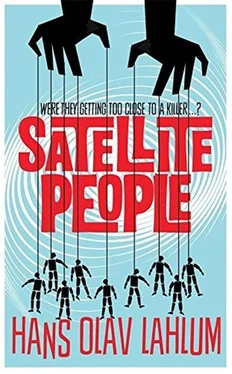I spent the next three hours taking down personal statements from all the ten witnesses in a guest room on the ground floor that became an improvised interview room. At nine o’clock, the deceased was collected by a police doctor, and I did not think there was much hope of getting any more from the ten survivors.
While it was quite clear to me that Magdalon Schelderup’s murderer had been sitting at the table, I still had no idea of where he or she had been sitting. And fortunately, neither did I know that it would take me seven long and demanding days to solve the crime, even with Patricia’s help. Nor could I have predicted that evening that any of the ten guests from Magdalon Schelderup’s final supper would follow him into death in the week that followed.
I decided to start by questioning the person at the table who was closest in age to the deceased Magdalon Schelderup, namely his sixty-seven-year-old sister.
Magdalena Schelderup asked for permission to smoke during the interview. Given the dramatic situation, she seemed otherwise to be remarkably calm. Her body was thin and bony, and the firmness of her handshake was a surprise. I noticed that she was wearing a thin pewter ring, which seemed oddly out of character for an older woman who by all accounts was very well off. However, I deemed what I could not see on her hand to be more significant – a wedding ring, in other words.
In explanation as to why she still had the same surname, Magdalena Schelderup told me without hesitation that she had never been married. To which she added quickly that she had never had any children either. The family had always been small, but now she was the only surviving member of her childhood home. She had grown up with an older and a younger brother. The younger brother, however, had been weak both physically and mentally, and had died as the result of an illness in spring 1946. Magdalon had dominated his siblings ever since they were little. In his first two years, he had enchanted his parents so much that they decided to give their daughter a name that was as close to their son’s name as possible.
Their father had also been a successful businessman, and the children had grown up in very privileged material circumstances. Following the death of the younger brother after the war, Magdalon had taken over the running of the family business and quickly expanded. Magdalena had passed her university entrance exam and taken a two-year course at the business school. However, when her parents died, she was left such a tidy sum of money that she could dedicate herself to her interests without having to worry about making a living. She still received an annual share of the profit from her parents’ companies, which far exceeded her outgoings.
Magdalena Schelderup took a pensive draw on her cigarette when I asked if she had had a close relationship with her brother. Then she shook her head, slowly. They were in contact often enough and shared a circle of mutual friends, but they had not discussed anything of a more serious nature together for the past twenty-five years. She had the impression that her brother seldom sought the advice of others regarding important matters, and to a great extent followed his own beliefs and whims. He had certainly never asked his sister for advice in connection with business or more personal matters. But she did claim to know him better than anyone else, all the same, having watched him her entire life.
‘If you want to understand my brother, be it as a businessman or a person, you have to understand that he has always been a player, since he was a little boy,’ Magdalena Schelderup added, out of the blue.
She continued without hesitation when I asked her to expand on this.
‘Ever since he was a youth, Magdalon has played with money and people, the business, his private life; in fact, his entire existence became nothing but a great game. My brother often played with high stakes. If you were to say that he sometimes played crooked, I would not contradict you. Magdalon played to the gallery out there to gain recognition. But most of all, he simply played to win and to get whatever he wanted. Be it money, houses or women,’ she concluded, with a bitter smile.
Magdalena Schelderup sat in silence for a while, lost in thought, smoking yet another cigarette. Then she continued, at a slower pace.
‘You may perhaps hear from others, both inside and outside the firm, that my brother was a man with a head for money, but not for people. That is what people who do not know him or understand him often say. Magdalon’s greatest gift was in fact that he had a finely honed ability to understand all kinds of people. He was exceptionally good at seeing other people’s strengths and weaknesses, and could often predict exactly how they would react in various situations. But he only used this to his own advantage. I can understand that others might at times think of him as cold and heartless in his dealings with other people, including his own family. But there is actually a difference between being inconsiderate and not understanding when one should be considerate, if one bothered at all about other people.’
I gave a thoughtful nod, and followed this up with a question about his familial relations in general. His sister hesitated, and then said that perhaps his wife and children would know more about that than she did. From her place at the table, she judged her brother’s third marriage, which had also been the longest, to be the ‘least unhappy’. The transition from the first to the second, and the second to the third had both been difficult periods. Her brother had without a doubt expected more of his two sons, but his expectations were not easily matched. It seemed that his daughter was the child he appreciated most, but that might also be because she was the youngest and still lived at home.
As far as Magdalon Schelderup’s inheritance was concerned, his sister claimed to know very little. Her annual share of the profits from her parents’ companies was secured for the rest of her life, no matter who now inherited the companies. It did not really matter much to her. She already had more money in the bank than she could use in a lifetime, and she had no one to leave it to.
She did not say it in so many words, but I understood what she meant. She, for her part, had no possible financial motive for her brother’s murder.
This sounded logical enough. And she seemed to be so relaxed when she said it that I almost struck her from the list of suspects. However, I did note with interest that she lived only a short distance away, and that she had been at home alone in her flat on both Friday and Saturday. The deceased Magdalon Schelderup’s sister had known him longer than anyone else round the table, and in practice had had the opportunity both to puncture the tyres on his car and to put powdered nuts in his food.
From the deceased’s sister, I moved on to his widow, having first made sure that she was in a fit state to be questioned. There was still not a tear to be seen on her cheeks.
Sandra Schelderup was a relatively slight, dark-haired woman, with a straight back and a determined face which gave the impression of a strong personality and will. She stated her age as forty-five. With regard to her background, she informed me briefly that she had grown up on a smallholding in one of the rural communities outside Trondheim, that she had trained as a stenographer, and had met her husband when she came to work as his secretary nearly twenty years ago. The marriage had been a happy one, despite the age difference, and his death had been very unexpected.
She claimed to know nothing about her husband’s telephone call to the police the day before, or the fact that the tyres on his car had been slashed. She had, however, noticed that her husband had been obviously worried of late. He had been more alert, and had carefully checked that all the doors were locked in the evening. Some weeks ago, he had taken an old revolver from his collection and stowed it in his jacket pocket whenever he went out. At home, it often lay on his desk during the day, and she had seen it on the bedside table in the evening and morning.
Читать дальше












